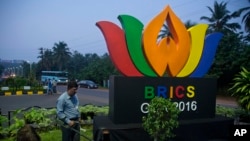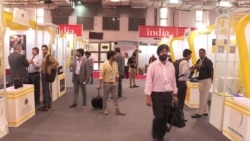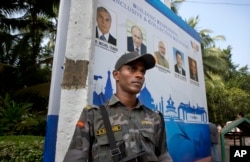At the sprawling exhibition grounds in the heart of New Delhi, Chinaland Solar Energy Company showcased a new design of solar panels at the first-ever trade exhibition organized by the BRICS group of emerging nations.
Alex Lee, the foreign trade manager of the Chinese company, explains that these panels are particularly suitable for India, which is massively expanding solar power generation. “You don’t put any roof tiles. You just use panels as roof tiles and they make power for you and also can be used as roof sheet,” he says.
Chinaland is among nearly 600 companies that took part in the trade fair hoping to capture new markets in the five emerging economies that make up BRICS – Brazil, Russia, India, China and South Africa.
WATCH: A Look Inside the Exhibition Grounds
The exhibition was held ahead of a summit of these five countries in India. The meeting aims to boost trade within the group, which at less than $300 billion is a meager five percent of the bloc’s total global trade.
Efforts to intertwine their economies more closely come at a time when the BRICS nations, once hailed as the engines of global growth, have been hit by a slowdown. Brazil and Russia are in recession, China’s growth is down to its weakest in a quarter century, South Africa’s economy has also contracted, and although India’s economy has revived, the country is still struggling to increase investment and create jobs.
Ahead of the BRICS summit, China proposed a free trade area among the group to advance trade, but the idea has not found favor from the others who fear being swamped by Chinese goods.
However, with the era of rapid expansion for the BRICS countries over, the five nations are pushing for more trade facilitation measures to help them tap the bloc’s potential, which accounts for about 25 percent of the global gross domestic product and 40 percent of the world’s population.
From South Africa, several wine makers are hoping to export their wines to India, a country where a wine culture is taking hold as a growing economy propels more people into the middle-income bracket.
Director of Cape Town-based wine company Zevenwacht, Denise Johnson sees huge opportunity in India; a market she is exploring for the first time. “Visiting some of the restaurants and hotels, wine culture is quite new and young in India, so it is going to take a long time for growth in the wine industry, but with just 25 million people just in Delhi, the potential is huge.”
Johnson, however, would like to see the high import duties on wine come down as these make foreign wines expensive. “I think there is huge potential for us to have trade agreements with each other and benefiting by reducing duties as they do in many other countries around the world.”
Warning that protectionist tendencies pose a threat to the world economy, Indian Finance Minister Arun Jaitley is pitching for more domestic reforms.
Economic Relations Secretary Amar Sinha in New Delhi says efforts are on to ease trade and cites a pact on customs facilitation the five countries are to sign as a step forward. “One of the agreements that is on customs cooperation is basically bringing down the trade barriers. That itself is a major trade facilitation effort.”
Lee from Chinaland Solar Energy agrees that it is not easy to tap the potential of emerging nations. “For our foreigner company it is not very easy to develop this market so we also have some partner in India, local partner,” says Lee.
Still, the need to find new customers as domestic economies slow down is tempting many businesses. India, whose economy is faring relatively better than the others, remains the most attractive market.
Chinese company ZTE Telecom wants to become a key player in selling mobiles in India after witnessing the success of other players. Although it is a significant player in other BRICS countries, India is one of the key markets the company has not tapped.
“Ten percent would be a huge market share which we are working on to get, which we gain in next five years in India,” says Sachin Batra, the Chief Marketing officer of ZTE in India.
While expanding trade ties may take time for the BRICS countries, experts say the group has some achievements to its credit on the economic front. The most significant is the setting up a BRICS Bank last year called the New Development Bank that has approved projects worth more than $ 800 million for renewable energy projects in member countries.
Trade experts, however, say the ambitions of the BRICS countries to seek a bigger voice in the global financial order created by Western countries in the aftermath of World War II remain largely unfulfilled.
Trade expert and professor at New Delhi’s Jawaharlal Nehru University, Biswajit Dhar, says “One really hoped that this alternative narrative as to how to move forward, thinking out of the box, that was something expected of the BRICS. Unfortunately they have not done that.”







